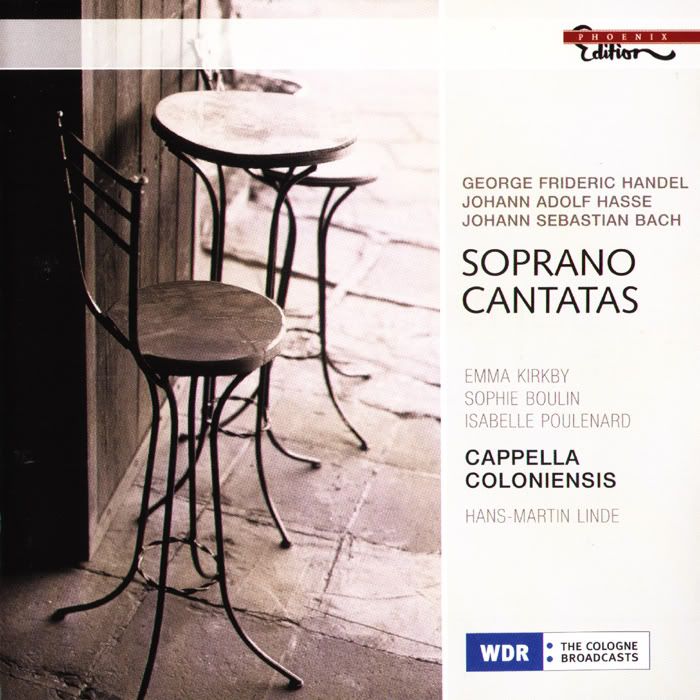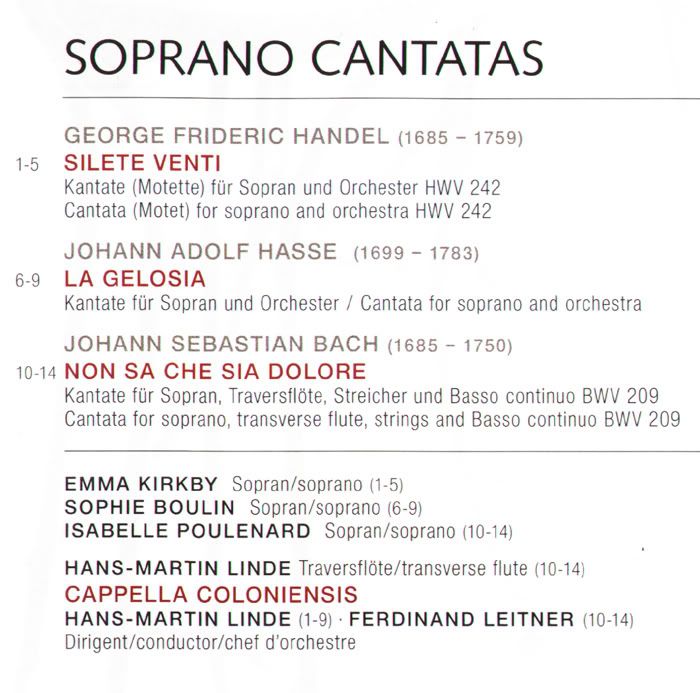 |
| NetLab · Rules · Torrent Tracker · Have a problem? · Eng/Rus |
 Help Help
 Search Search
 Members Members
 Gallery Gallery
 Calendar Calendar
|
| Welcome Guest ( Log In | Register | Validation ) | Resend Validation Email |
|
Posted: 03-07-2011, 21:23
(post 1, #1023760)
|
||||||||||||||||||
|
Pro Member Group: Members Posts: 695 Warn:0% |
Label: Phoenix Edition, Phoenix171 Year: 2009 Performers: Emma Kirkby - soprano Sophie Boulin - soprano Isabelle Poulenard - soprano Cappella Coloniensis Hans-Martin Linde - conductor Ferdinand Leitner - conductor Tracklist: George Frideric Handel (1685 - 1759) Silete venti, HWV 242 01. Sinfonia 00:02:21 02. Silete Venti 00:03:25 03. Dulcis amor Jesu care 00:06:43 04. O fortunata anima 00:00:34 05. Date serta, date flores 00:12:58 Johann Adolf Hasse (1699 - 1783) La gelosia 06. Recitative: Perdona, amata 00:01:02 07. Aria: Bei labbri che Amore 00:07:35 08. Recitative: Son reo, non mi defendo 00:02:13 09. Aria: Giura il nocchier 00:07:31 Johann Sebastian Bach (1685 - 1750) Non sa che sia dolore, BWV 209 10. Sinfonia 00:06:30 11. Recitative: Non sa che sia dolore 00:00:45 12. Aria: Parti pur e con dolore 00:08:31 13. Recitative: Tuo saver al tempo 00:00:30 14. Aria: Ricetti gramezza e pavento 00:05:34 Total Playing Time: 01:06:12 Historical performance practice has its own story too. It is fascinating to encounter, towards the end of the first decade of the 21st century, recordings from the 1980s. Emma Kirkby, who is still active today, was considered to be the uncrowned queen of emotional, instrumentally-led vocal tone, which was seen as paradigmatic for performances of baroque music. In Handel’s Latin motet "Silete, venti" she gives a virtuoso example of her art. Since the work cannot have been written for the Anglican church service, the supposition remains that Handel wrote it especially for one of his much-loved female vocal virtuosi from the opera company. Emma Kirkby’s colleague Sophie Boulin is no less a virtuoso than the English woman, as is proved by the cantatas by Bach and Hasse. The occasion and the exact circumstances for the creation of Bach’s cantatas "Non sa che sia dolore" BWV 209 are not known; possibly the piece was even written by another composer. "La Gelosia" ("Jealousy"), the solo cantata written in 1762 by Johann Adolf Hasse and based on a text by his preferred librettist Pietro Metastasio, conveys in exemplary fashion an impression of the style of the courtly aristocratic Italian opera. This is another outstanding entry in Phoenix Edition’s series of 1980s recordings by the Cappella Coloniensis...Of course, Emma Kirkby is world-famous and probably needs no introduction, yet though I am familiar with the excellent Isabelle Poulenard, I doubt that everyone else is, and I was not previously familiar with Sophie Boulin at all. It’s interesting as well as instructive to have three cantatas by three different contemporaries of the Baroque era on one CD. Despite the similarities between Handel and Hasse, each of them had his own distinctive voice, and if Bach is the most celebrated of the three and Hasse the least well known, it is through no fault (or credit) of the music. In structural terms, Hasse opted for a sung recitative by soprano and harpsichord to precede the cantata proper, almost in the style of an extended dramatic scena for opera; Handel employs his usual vacillation between placid and highly dramatic musical elements, the last section of his cantata-the 13-minute aria "Date serta, date flores"-being the most interesting of all as it constantly switches back and forth between lyrical and fiery elements. This grand finale is Kirkby’s finest moment, allowing her more expression and more varied tone color than the calmer first aria, "Dulcis amor, Jesu care." Hasse’s cantata, as the title indicates, is involved with jealousy and the protagonist’s efforts to overcome it. Boulin has one of those fascinating voices with the characteristic quick vibrato of the French school, some of which is utilized to facilitate her coloratura runs. She is also a very expressive singer, alive to the meaning of the text and its subtleties. Bach’s secular Cantata No. 209 is not as well known or often recorded as its partners, the "Wedding," "Hunt," or "Coffee" cantatas, possibly because its text is more generalized and not specifically centered on a particular theme. The title translates as "He knows not what sorrow is," and it’s unusual for being set in Italian, not German. Bach obviously had some fun with this piece, tailoring his usual fastidious contrapuntal technique to the Italianate style of recitative and aria, though since the piece is also written for traverse flute, there is a wonderful extended Sinfonia, also in the Italian style, featuring that instrument. Conductor Linde, who started out as a flutist, plays gorgeously here, while the frequently underrated Leitner conducts. What a treat to hear such expressive flute-playing in early music! (Hint to Linde: if you’re still playing the instrument, break it out more often!) Poulenard, also a French chanteuse, has less vibrato than does Boulin, but no less involvement or command of coloration... There are nine other recordings of the Bach cantata available...but these appear to be the only recordings of the Handel and Hasse works. Handel’s Silete Venti was written in the 1720s. This was rather late in his career for a Latin motet-especially one constructed like a cantata. It could hardly have been written for an English church service so we must presume that it was written for another occasion, presumably for one of his star sopranos. It is a dazzling work. Handel was justly proud of it, as he raided it numerous times, notably for his oratorio Esther. I have always assumed that Handel’s sopranos had bigger, richer-toned voices than Kirkby but this is not a question which can be definitively answered. Instead we must address ourselves to the question of whether Kirkby satisfies in this music, and the answer must be a resounding yes. The motet was recorded over twenty years ago when she was in her prime. The voice is beautifully focused and flexible. She navigates around Handel’s vocal lines with obvious joy and communicates her enthusiasm. This pin-point accuracy is combined with her familiar sweetness of tone. No, she doesn’t have a big dramatic voice, but what she does here is testimony enough to her musicality and the beauty of her voice. The disc contains three cantatas/motets by three baroque composers, all recorded during the 1980s by three rather different sopranos. Frankly, I would have preferred it if we had had Kirkby for all three. But the repertoire is fascinating so I am happy to report that the other two sopranos are more than adequate. Sophie Boulin is the soloist in Johan Adolf Hasse’s cantata La Gelosia. Hasse was 14 years younger than Handel and Bach. Born in Hamburg, like Handel he travelled to Italy in his youth and became one of the leading purveyors of opera seria. He married Handel’s prima donna, Fautina Bordoni, and the pair ruled the Dresden Opera House. Hasse’s operas were much beloved of singers. His work lacks the dramatic and emotional depth of Handel’s, but Hasse was able to construct brilliant virtuoso arias which enabled singers to show off their best talents. La Gelosia sets a text by Metastasio, many of whose opera libretti Hasse set. The cantata works like a short opera-scena. Whilst Handel would probably have managed to write a work which made the singer sound more jealous, Hasse has created a pair of arias which show off the singer quite brilliantly. Boulin does not quite have the same easy flexibility as Kirkby, particularly in the upper reaches of the voice. However she copes well with Hasse’s demands and gives a more than creditable account. The final piece on the disc is an Italian cantata which is probably by J.S. Bach. The text, though in Italian, was written by a German for an unspecified occasion. The music, if not by Bach, comes from his circle. It must be borne in mind that we know few of Bach’s early, non-sacred cantatas. The piece opens with a lovely movement for strings and solo transverse flute. When the voice enters things are a little less happy, Isabelle Poulenard has a rather edgy tone and her passage-work tends to be laboured. This is not an ideal performance, but Poulenard’s limitations are not enough to put one off; there is still much to enjoy. All three singers are well accompanied by Cappella Coloniensis and this makes for a delightful programme.  
This post has been edited by kgkk on 03-07-2011, 21:26 |
||||||||||||||||||
|
|||||||||||||||||||


Powered by Invision Power Board v1.3.1 Final.

